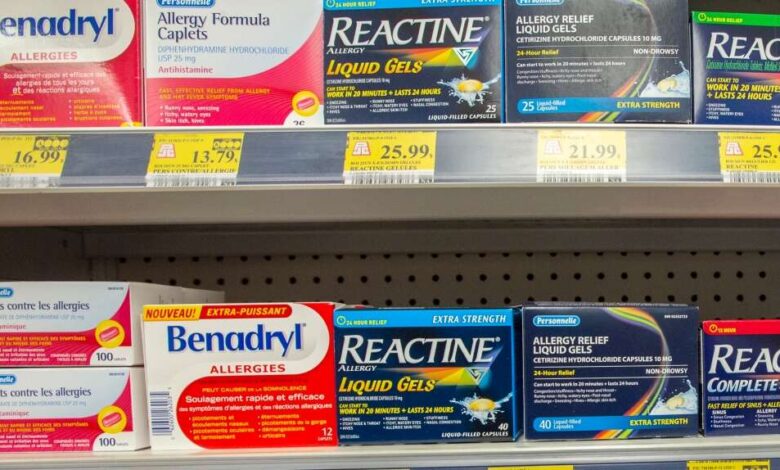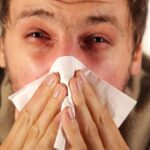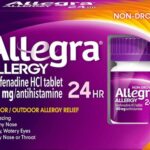What Is The Safest Allergy Medicine?

Allergies are abnormal reactions of the immune system that occur in response to otherwise harmless substances. Allergies are among the most common medical disorders. It is estimated that 60 million Americans, or more than one in every five people suffer from some form of allergy, with similar proportions throughout much of the rest of the world. Allergy is the single largest reason for school absence and is a major source of lost productivity in the workplace.
Atopy is the genetic tendency to develop allergic diseases. When atopic people are exposed to allergens they can develop an immune reaction that leads to allergic inflammation. This can cause symptoms in the:
- Nose and/or eyes, resulting inallergic rhinitis (hay fever) and/or conjunctivitis.
- Skin resulting in eczema, or hives (urticaria).
- Lungs resulting in asthma.
What happens when you have an allergic reaction?
When a person who is allergic to a particular allergen comes into contact with it, an allergic reaction occurs:
• When the allergen (such as pollen) enters the body, it triggers an antibody response.
• The antibodies attach themselves to mast cells.
• When the pollen comes into contact with the antibodies, the mast cells respond by releasing histamine.
• When the release of histamine is due to an allergen, the resulting inflammation (redness and sweliing) is irritating and uncomfortable.
Similar reactions can occur to some chemicals and food additives. However if they do not involve the immune system, they are known as adverse reactions, not allergy.
What effective prevention and treatment options are available?
Allergen avoidance or minimization relies on identifying the cause of the allergy and taking steps to reduce exposure to the allergen. For example, reducing dust mite in the home may help reduce symptoms in people who are allergic to mites.
Medications used to treat allergies include:
• Antihistamines: block histamine release from mast cells, reducing symptoms. Non-sedating antihistamine tablets are available from pharmacies without a prescription. Antihistamine nasal and eye sprays can also be used.
• Intranasal cortiocosteroid nasal sprays (INCS): are effective for treatment of moderate to severe allergic rhinitis when used correctly. A prescription may be required for stronger dose INCS. Ask your pharmacist or doctor for advice.
• Combination therapies (INCS and antihistamine): are used for treatment of moderate to severe allergic rhinitis and offer the advantages of both medications.
• Medicated eye drops: can be helpful in some cases, ask your doctor or pharmacist for advice.
• Adrenaline (epinephrine): is used for first aid emergency treatment of life threatening severe allergic reactions (anaphylaxis). Adrenaline is usually given using an adrenaline autoinjector that can be given without medical training.
Non-medicated treatments such as saline sprays are used for treating allergic rhinitis and sinusitis.
Allergen immunotherapy (also known as desensitisation) is a long-term treatment which changes the immune system’s response to allergens. It involves the administration of regular, gradually increasing amounts of allergen extracts, by injections or by sublingual tablets, sprays or drops.
If you have an allergy, see your local pharmacist or doctor. In some cases, you will be referred to a clinical immunology/allergy specialist for further investigations and advice.
What is the safest allergy medicine?
Medications that often can be safely used by people with significant allergies include the following:
Nasal corticosteroids: Nasal corticosteroids relieve congestion by decreasing the inflammation in your nose. Unlike inhaled corticosteroids used for asthma, nasal versions are sprayed directly into the nasal passages. Nasal corticosteroids are commonly available in spray form. They’re also available as aerosol liquids and powders.
Fexofenadine (Allegra): Fexofenadine is an antihistamine used to relieve allergy symptoms such as watery eyes, runny nose, itching eyes/nose, sneezing, hives, and itching. It works by blocking a certain natural substance (histamine) that your body makes during an allergic reaction.
Cetirizine (Zyrtec): Cetirizine is an antihistamine used to relieve allergy symptoms such as watery eyes, runny nose, itching eyes/nose, sneezing, hives, and itching. It works by blocking a certain natural substance (histamine) that your body makes during an allergic reaction.
Loratadine (Claritin): Loratadine is an antihistamine used to temporarily relieve the symptoms of hay fever (allergy to pollen, dust, or other substances in the air) and other allergies. These symptoms include sneezing, runny nose, and itchy eyes, nose, or throat. Loratadine is also used to treat itching and redness caused by hives.
Diphenhydramine (Benadryl): Diphenhydramine is an antihistamine used to relieve symptoms of allergy, hay fever, and the common cold. These symptoms include rash, itching, watery eyes, itchy eyes/nose/throat, cough, runny nose, and sneezing. This medication works by blocking a certain natural substance (histamine) that your body makes during an allergic reaction.





